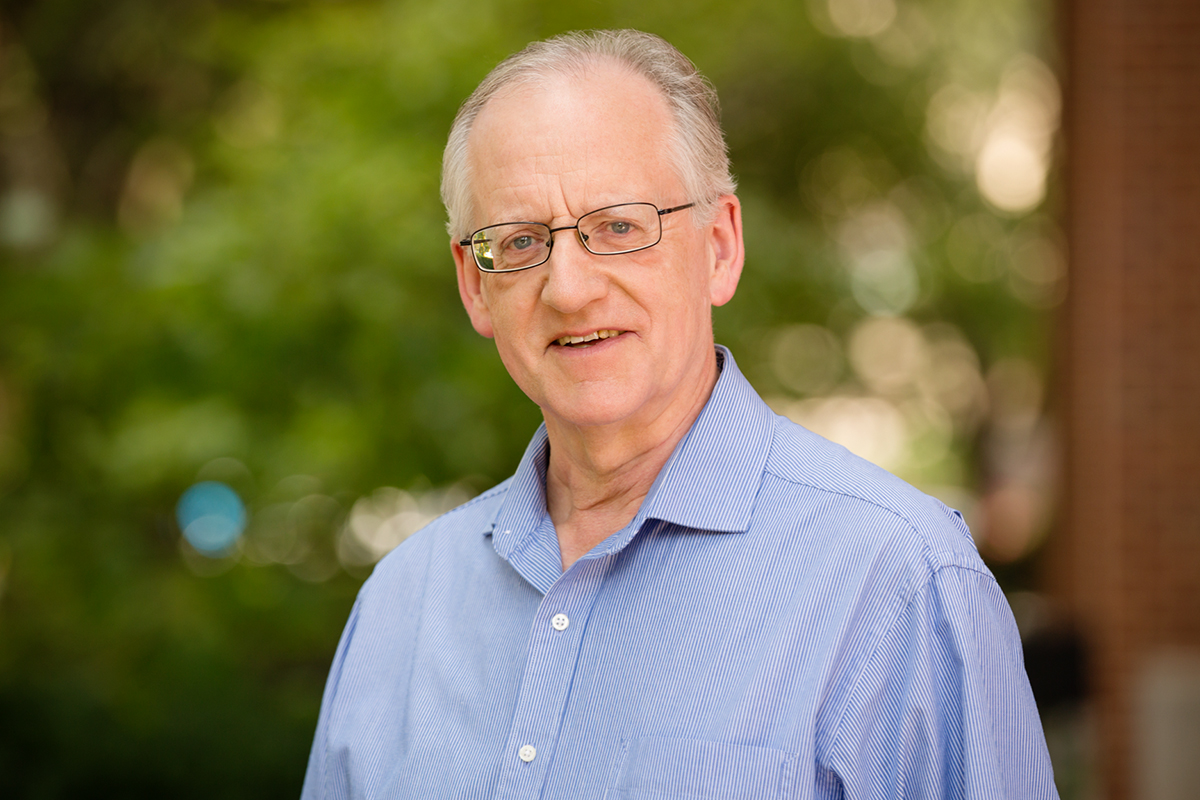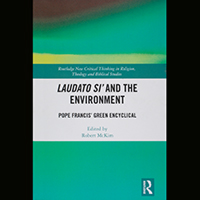
Robert McKim, a professor emeritus of religion, edited a book looking at how religion might respond to climate change. "Laudato Si' and the Environment" is a response to Pope Francis' environmental encyclical of 2015.
Photo by L. Brian Stauffer
CHAMPAIGN, Ill. — Climate change is an issue of such concern that Pope Francis in 2015 published "Laudato Si'," an environmental encyclical calling for protection of Earth and its environment, while also improving the plight of the poor.
A new book analyzes the encyclical and asks whether and how religion can take a leadership role in addressing environmental crises. "Laudato Si' and the Environment" was edited by Robert McKim, a University of Illinois at Urbana-Champaign professor emeritus of religion. McKim specializes in the philosophy of religion and applied ethics. The book features essays from scholars of different disciplines and cultural and religious perspectives, each responding to the encyclical and its implications for environmental issues.
"The religions exercise considerable influence in the lives of many people. They do not hesitate to try to provide guidance in many other areas of life. Why not in the case of this contemporary crisis?" McKim wrote.
In his essay, McKim wrote about Pope Francis' opposition to what he called in his encyclical the "technocratic paradigm" – the relentless pursuit of profit and the idea that technology that permits ever greater mastery and manipulation of the world is acceptable as long as it is profitable.
"While it's perfectly legitimate for us to make use of the world around us, (the pope) wants us to pay attention to the value of other animals, the value of ecosystems and the value of places that are precious and that should be approached by us with a sense of belonging in them and a wish to protect them. He's opposing the idea of the world being up for grabs and exploited by us, with the only limits being what science and technology enable us to do," McKim said. On the other hand, Pope Francis is not anti-technology. "I see the pope as being solidly on the side of all technologies that enable humans to live rich lives, as long as it's not at the expense of ecosystems and the long-term flourishing of life in all its forms, and as long as we operate within limits that arise from the value of things."
A major theme in the pope's document is the tension between responding to the cry of the world's poor and the cry of Earth, McKim said. "If we attend to the cry of the poor and the poor become much better off, their energy consumption and consumption in general increases," which can be detrimental to the environment, he said. Two chapters in the book probe that dilemma.
Darrel Moellendorf, a professor of international political theory at Goethe University in Frankfurt, Germany, who researches climate change and justice, argued in his essay that the poor should not have to sacrifice their right to sustainable development and to the increased energy consumption that this development will involve as we attempt to combat climate change, and that highly developed, industrialized countries should bear more of the burden by moving to a zero-carbon economy.
"It's a call for the better-off to step up and make sure those at the bottom won't be paying the price for tackling climate change," McKim said.
A former environmental economist for the World Bank and a University of Maryland public policy professor emeritus whose research looks at economic development, population, resources and the environment, Herman Daly wrote about population growth and immigration. He favors strong international borders and opposes large-scale migration. Daly advocates helping those in poverty through aid packages patterned after the Marshall Plan, "combined with the better-off drastically curtailing consumption and switching from a growth to a steady state economy – something he's been advocating for years," McKim said.
Eric Freyfogle, a professor emeritus of property law at the University of Illinois College of Law who specializes in natural resources, land use, wildlife and environmental law, looked at the implications of "Laudato Si'" for private property ownership. His idea is that property ownership should be governed by rules designed to foster the common good. This requires promoting the welfare of all members of society and keeping land productive, resilient and biologically diverse.
An essay by Irish author Margaret Daly-Denton, whose research interests include Biblical interpretation, analyzes the pope's use of passages that Christians point to as evidence that the Scriptures are ecologically sensitive. She also wrote about the view that the Bible should be interpreted in light of current realities. She noted that in the 1960s, Christians in South America found that their fight for social justice led them to read the Book of Exodus in a new way. She suggested that something similar is happening "as Christians become more and more engaged in the care of our common home," and she summarized recent attempts to provide an ecological reading of the Bible.
The essays also cover Indigenous beliefs that reject a view of human domination of nature; treatment of animals; population; the scriptural sources of authority Pope Francis uses in the document; how members of the Catholic Church have responded to the encyclical; and the need to rethink human uniqueness.
Pope Francis' encyclical is a challenge to humanity, and it emphasizes individual action, McKim said.
"We urgently need to reduce the human impact on the Earth," he wrote in the book. "The task we confront is learning to live on this planet without ruining it."







